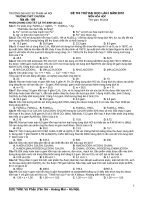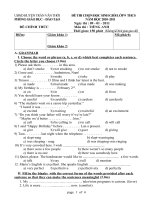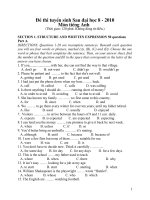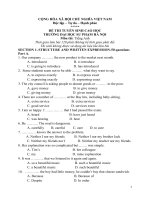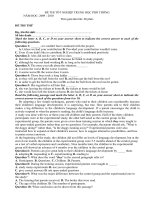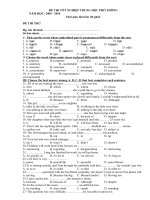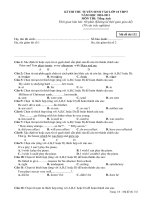Đề thi cao học tiếng anh 2010 TRƯỜNG ĐẠI HỌC SƯ PHẠM HÀ NỘI
Bạn đang xem bản rút gọn của tài liệu. Xem và tải ngay bản đầy đủ của tài liệu tại đây (136.32 KB, 10 trang )
§Ò thi tuyÓn sinh Sau ®¹i häc 8 - 2010
M«n tiÕng Anh
(Thêi gian: 120 phót. Kh«ng dïng tõ ®iÓn.)
SECTION 1. STRUCTURE AND WRITTEN EXPRESSION 50 questions
Part A.
DIRECTIONS. Questions 1-20 are incomplete sentences. Beneath each question
you will see four words or phrases, marked (A), (B), (C) and (D). Choose the one
word or phrase that best completes the sentence. Then, on your answer sheet, find
the number of the question and fill in the space that corresponds to the letter of the
answer you have chosen.
1. If you with her, she can not find the way to that village.
A. don't go B. not went C. didn't go D. wouldn't go
2. Please be patient and …… to the fact that she's not well.
A. getting used B. got used C. get used D. used
3. I had just put the phone down when my boss …… back.
A. call B. called C. calls D. was calling
4. Is there anything I should do ………running short of money?
A. in order to avoid B. avoiding C. so that to avoid D. avoid
5. She has known my family ……… we first came to this country.
A. for B. since C. when D. and
6. We …… to go there every winter for over ten years, until my father retired.
A. like B. used C. usually D. enjoyed
7. Visitors …………to arrive between the hours of 9 and 11 a.m. daily.
A. expects B. is expected C. are expected D. expecting
8. I can lend you the money …… you promise to give it back by next week.
A. when B. unless C. if D. so
9. You’d better bring an umbrella ………. it’s raining.
A. although B. until C. because D. because of
10. I saw a few flats but none of them …… suitable for me.
A. were B. was C. are D. is
11. You don't have to decide now. Think it carefully ………
A. for some day B. for day C. for any days D. for a few days
12. This is the school …… my father used to teach.
A. where B. when C. there D. why
13. It isn’t easy ……. looking for a job at my age.
A. to start B. start C. starting D. when
14. William Shakespeare is the playwright ……. wrote “Hamlet”.
A. whom B. whose C. who D. which
15. The English are …… watching football.
1
A. interested in B. fond at C. bored in D. worried with
16. She was determined never to let them……… her private life again.
A. will enter B. to enter C. enter D. entering
17. I what you mean but I don't agree with you.
A. am going to see B. had seen C. am seeing D. see
18. I don’t mind , but I try not to do it when possible.
A. cooking B. cooked C. to cook D. cook
19. Surely, some of… times of my life have been spent in our kitchen.
A. happiest B. the happiest C. the most happy D. most happy
20. The trade unions don’t want a strike, and …… the management.
A. neither does B. so does C. either does D. too
Part B.
DIRECTIONS. In questions 21-50 each sentence has four underlined words or
phrase marked (A), (B), (C) and (D). Identify the one underlined word or phrase
that must be changed in order for the sentence to be correct. Then, on your answer
sheet, find the number of the question and fill in the space that corresponds to the
letter of the answer you have chosen.
21. Mobiles are one of the most interesting invention we have ever had.
A B C D
22. If you had an immediate operation you can save your eyesight.
A B C D
23. He has so many brilliant talents that everybody know him.
A B C D
24. Cambodian is the more difficult language in the world.
A B C D
25. I wish I don’t have to work with that project team.
A B C D
26. Danny spent such an enjoyably vacation in Europe that he plans to return.
A B C D
27. Although the quantity was small, we had supplies enough to finish the work.
A B C D
28. Kurt had such many interesting plans that we wanted to work in his team.
A B C D
29. We wish today were sunny in order we can spend the day in the country.
A B C D
30. Our Spanish professor would like us spending more time in the laboratory.
A B C D
31. Sam used to living in Utah, but his company has transferred him to Georgia.
2
A B C D
32. Hal's new sports car costs much more than him friend Joel’s.
A B C D
33. Stand among so many strangers, the frightened child sobbed uncontrollably.
A B C D
34. Those who plans to attend the meeting have to register soon.
A B C D
35. Mary was two hours late for the meeting because the storm.
A B C D
36. Last week we bought our new television with a two-years warranty.
A B C D
37. The director felt badly about not giving Mary the position she had long sought.
A B C D
38. They hope go skiing in the mountains this weekend if the weather permits.
A B C D
39. Despite she looks very young, she is twice as old as my elder sister.
A B C D
40. We thought our cameras are the same, but in fact they are different.
A B C D
41. Louise is the most capable of the three girl trying for the part in the play.
A B C D
42. They played such well last night that they surprised their audience.
A B C D
43. There are foreigners who are attending languages classes at our campus.
A B C D
44. My book is different from yours because my has a vocabulary section.
A B C D
45. Writers like J. London and E. A. Poe is not only prolific but also interesting.
A B C D
46. It is most important for him to speak to the dean before leave for his vacation.
A B C D
47. I need both brown sugar and butter bake a Hawaiian cake.
A B C D
48. Despite her smiling face, she felt much more sadder than the winner.
A B C D
49. After raising the flag to commemorate the day, the mayor gave a speech long.
A B C D
50. If you sit in that position for too long, you would get a cramp in your leg.
A B C D
SECTION 2. READING COMPREHENSION
3
50 questions
DIRECTIONS. In this section you will read a number of passages. Each one is
followed by approximately 6 questions about it. For questions 51-100, choose the
one best answer, (A), (B), (C) or (D), for each question. Then, on your answer
sheet, find the number of the question and fill in the space that corresponds to the
letter of the answer you have chosen. Answer all of the questions following a
passage on the basis of what is stated or implied in that passage.
Passage 1.
People usually sing because they like music or feel happy. They express their
happiness by singing. When birds sings, however, their songs usually mean more
than that. They sing to give information. Their songs are their language.
The most beautiful songs are sung by male birds. They sing when they want
to attract a female bird. It is their way of saying that they are looking for a wife.
Birds also sing to tell other birds to keep away. To a bird, his tree is his home. He
does not want strangers to come near him, so he sings to warn them.
If a bird can not sing well, he usually has some other means of giving
information. Some birds dance, some spread out their tails, and some make their
own signs. All of these are their language.
51. Songs are language to
A. people B. birds C. music D. happiness
52. Which one below is not the reason for a bird to sing?
A. To give information B. To attract a female bird
C. To fight D. To tell other birds to keep away
53. A bird can give information by one of the following ways EXCEPT
A. dancing B. spreading out its tail
C. making its own signs D. flying
54. ‘They’ in line 3 refers to
A. people B. happiness C. songs D. birds
55. ‘them’ in line 7 refers to
A. birds B. female birds C. strangers D. wives
56. ‘to keep away’ (line 6) is similar in meaning to
A. to come near B. to keep guard C. not to go D. not to come near
57. ‘strangers’ in line 7 refers to those whom
A. you know well B. you love
C. you don’t know D. you play with
Passage 2
4
Ludwig Lazarus Zamenhof, born in 1859 in Poland, is the inventor of
Esperanto, an international language.
As a student at secondary school, Zamenhof worked hard to create a language
for international communication, which had simple grammar. By 1878, his
project was finished. However, Zamenhof was too young then to publish his work.
After leaving school he began to study medicine. In 1885, he started working as a
doctor. He showed Esperanto to his friends and they told him what they thought
about it. He believed that Esperanto could be used to improve understanding
among countries. Zamenhof's friends worked very hard to spread the language.
They tried to persuade schools to teach it. However, only a few people today speak
Esperanto because more people are using English as a foreign language.
58. What is Zamenhof’s nationality?
A. Russian B. Polish C. American D. German
59. Zamenhof started working on the project of the new language
A. at university B. in 1859 C. at school D. after school
60. Which adjective below is correct to describe Esperanto?
A. difficult B. beautiful C. rich D. simple
61. Zamenhof didn’t publish his work in 1878 because
A. he was too young B. he didn’t have money
C. his friends didn’t help him D. the language was not good
62. Zamenhof’s friends did the following except
A. They told him what they thought about Esperanto.
B. They helped him spread Esperanto.
C. They persuaded schools to teach Esperanto.
D. They collected money for him.
63. Today Esperanto is
A. popular B. widely used C. dead D. spoken by a few
64. What does ‘which’ in line 4 refer to?
A. Zamenhof B. communication C. a language D. grammar
65. What does ‘they’ in line 7 refer to?
A. his practice B. Esperanto C. his friends D. a doctor
66. What does ‘it’ in line 10 refer to?
A. Zamenhof's friends B. schools C. the world D. the language
67. ‘improve’ in line 8 has the same meaning as
A. create B. spread C. make better D. teach
68. ‘spread’ in line 9 means
A. make popular B. improve C. teach D. create
Passage 3.
5
Our eyes are the most important of our five senses. We receive 80%
information about the world through our eyes. We also send signals to other people
with our eyes.
Large eyes are usually more attractive. We can't change our eyes, but we can
make them look larger with eye make-up. Eye make-up isn't new. Pictures in the
Pyramids show that the ancient Egyptians - both men and women - used it. False
eyelashes can make eyelashes longer. Glasses can also make eyes look bigger.
We do not often look into other people's eyes for long, especially when they
are very close. Eye contact can be dangerous and intimate. That is why people
don't look at each other when they are in a lift.
69. How much information about the world don’t we receive through our eyes?
A. 80% B. 20% C. 0% D. 50%
70. Which statement is not correct to talk about eye make-up?
A. Egyptian men used it.
B. It can make eyes look larger
C. It is a new product
D. It can be used by women.
71. Which one below can make our eyes look bigger?
A. eye make-up B. signals C. false eyelashes D. pictures
72. Eyes are not used for
A. receiving information
B. showing one’s feelings
C. sending signals
D. making glasses
73. ‘Eye contact can be dangerous and intimate’, so what should we avoid doing?
A. Looking into other people’s eyes for long.
B. Using a lift with other people.
C. Wearing eye make-up.
D. Wearing glasses.
74. What does them (line 5) refer to?
A. Large eyes B. our eyes C. signals D. other people
75. What does it (line 6) refer to?
A. eye make-up B. the Pyramids C. ancient Egyptians D. pictures
Passage 4
6
Education is important in every country, but in Japan it is more important. In
America, for example, people usually want to try more than one job. They change
jobs quite often. In Japan it’s different. People usually stay with the same
company from the time they leave school or university until they retire. So the
children must do well at school to get a good job when they leave, because after
that it’s too late.
The hard work starts at 12 when children move to junior high school. Study
becomes less relaxed and more competitive. Children go to school on Saturday,
too. So they have 6 days of school a week. They also go to extra classes in the
evening. At home, they have 3 or 4 hours’ homework every night. They have no
time to be bored.
76. Education is
A. more important in America than in Japan.
B. as important in Japan as in other countries.
C. not as important in Japan as in America
D. more important in Japan than in any other country.
77. Education is very important in Japan because Japanese people
A. enjoy studying
B. want to try more than one job
C. stay in one job until they retire
D. want to work for a big company
78. Who changes jobs quite often?
A. the Americans B. The Japanese C. the retired D. the children
79. Japanese children
A. start working hard as soon as they go to school.
B. become more relaxed when they move to junior high school.
C. go to school six days a week.
D. always stay at home in the evening.
80. What does ‘it’ in line 1 refer to?
A. Education B. every country C. Japan D. one job
81. People usually stay with the same company suggests that
A. people change jobs quite often
B. people stay at work the whole day
C. people work for the same company
D. people like working for a company
82. They have no time to be bored means that Japanese children are always
A. happy B. relaxed C. competitive D. busy
Passage 5
7
The leaning tower of Pisa in Italy is one of the most famous buildings in the
world. It is famous not because of its beauty or size, but because it leans to one
side. Each year the tower attracts thousands of visitors from all around the world.
The leaning tower has a height of 180 feet. Visitors can climb to the top for a
good view of the city below.
As soon as the building of the tower began in 1174, it began to lean to the
south. The work was stopped several times to correct the leaning with no success.
Today the tower has leaned more than 17 feet. Some people would like to pull
it down and rebuild it. Otherwise, the tower might fall very soon.
83. Which information below is not correct about the tower of Pisa?
A. It is in Italy B. It is a famous building
C. People visit it D. it is modern
84. People come to visit the leaning tower because…………….
A. it is old B. it is big and high
C. it is beautiful D. it leans to one side
85. The leaning tower is…………….high.
A.180 feet B. 17 feet C. 20 meters D. 1174 meters
86. The tower was built in
A. the early 11
th
century B. the late 11
th
century
C. the early 12
th
century D. the late 12
th
century
87. The tower began to lean to the south…………….
A. in 1174 B. when the work was stopped
C. over a hundred years ago D. after it was completed
88. Some people think that the tower
A. should be kept for visitors B. should be rebuilt
C. will attract more visitors D. can not lean more
89. ‘famous’ in line 1 is closest in meaning to
A. loved B. high C. well-known D. beautiful
90. What does ‘it’ in line 9 refer to?
A. 17 feet B. some people C. the tower D. today
91. The aim of this passage is
A. to prove that the tower of Pisa is famous.
B. to attract more people to the tower of Pisa.
C. to introduce the tower of Pisa.
D. to show where the tower of Pisa is.
Passage 6
8
For over six million American children, coming home after school means
coming back to an empty house. All of them spend part of each day alone. They
are called “latchkey children”, who look after themselves while their parents work.
Lynette Long, the principal of an elementary school said, “We have a lot of
kids with keys around their necks. There are so many keys!” She tried to talk to the
children found out that they were house keys.
The biggest problem for these children is fear. So what do they do? Most of
them hide. They may hide under a bed or in a closet. Some watch TV. They often
turn the volume up. Some may phone and engage in long talks with their friends.
However, most parents are slow to admit that they leave their children alone.
92. The phrase “an empty house” in the passage mostly means
A. a house with no people inside B. a house with no furniture
C. a house which is too quiet D. a house which is too big
93. Which statement is correct about all the children in the passage?
A. They all watch TV B. They spend part of each day alone
C. They don’t have parents D. They don’t like their homes
94. “latchkey children” in the passage means children who
A. close doors with keys
B. like to carry keys around
C. are locked inside houses
D. look after themselves while their parents work
95. ‘who’ in line 3 refers to
A. parents B. latchkey children C. each day D. part of each day
96. Lynette Long got to know about latchkey children’s by
A. visiting their homes B. doing an experiment
C. interviewing their parents D. talking to them
97. Why do a lot of kids have keys around their necks?
A. to open school doors. B. for fun
C. to show their friends D. to enter their houses
98. The main problem of latchkey children is
A. fear B. tiredness C. boredom D. loneliness
99. Latchkey children do the followings to overcome their fears EXCEPT
A. hiding somewhere B. talking to their friends.
C. doing their homework. D. watching TV.
100. Which statement is correct to talk about the parents of latchkey children?
A. They don’t want to admit that they leave their children alone.
B. They don’t talk about themselves.
C. They teach their children by leaving them at home alone.
D. They enjoy working far from home.
KEY ANSWER TO TEST PAPER 8-2010
9
Section 1-Part A Section 1-Part A Section 2 Section 2
1. A 21. C 51. B 76. D
2. C 22. A 52. C 77. C
3. B 23. D 53. D 78. A
4. A 24. C 54. D 79. C
5. B 25. B 55. C 80. A
6. B 26. B 56. D 81. C
7. C 27. C 57. C 82. D
8. C 28. A 58. B 83. D
9. C 29. B 59. C 84. D
10. A 30. C 60. D 85. A
11. D 31. A 61. A 86. D
12. A 32. D 62. D 87. A
13. A 33. A 63. D 88. B
14. C 34. A 64. C 89. C
15. B 35. D 65. C 90. C
16. C 36. D 66. D 91. C
17. D 37. B 67. C 92. A
18. A 38. A 68. A 93. B
19. B 39. A 69. B 94. D
20. A 40. B 70. C 95. B
41. C 71. A 96. D
42. B 72. D 97. D
43. D 73. A 98. A
44. C 74. B 99. C
45. C 75. A 100. A
46. D
47. C
48. C
49. D
50. D
10
